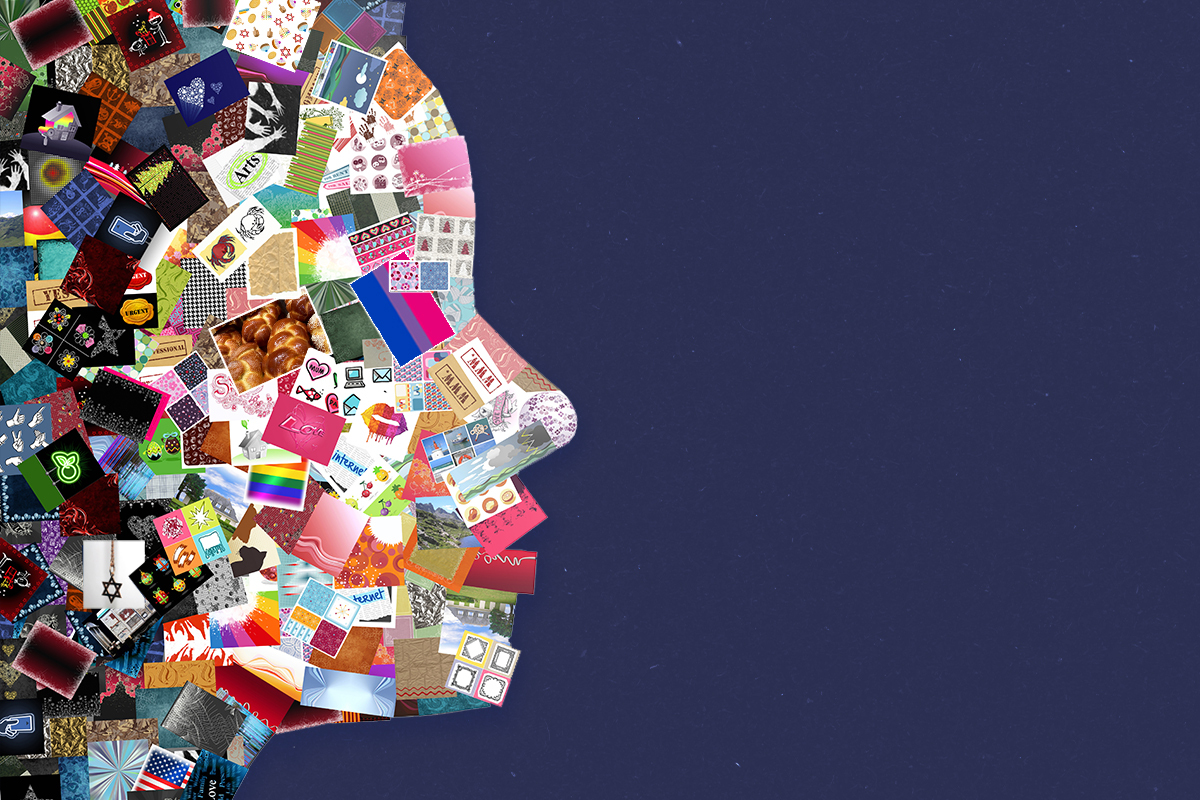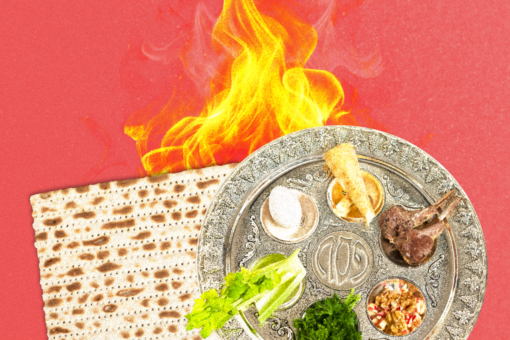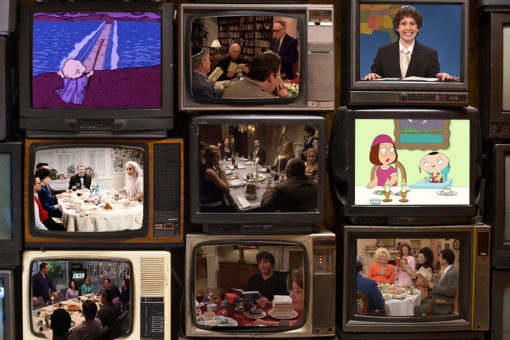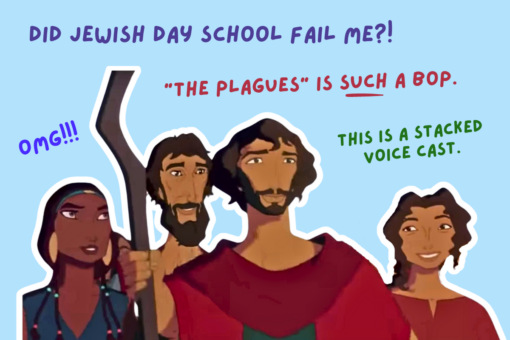Outside of my bubble, nobody was gay or Jewish. This hyperbolic reality hit six years ago after graduating from Barnard College, where seemingly everyone I knew was both.
My whole life, I had been surrounded by Hebrew school grads and Pride attendees. Suddenly, I, a bisexual, patrilineal Jew, was often the lone representative of my people. “Half Jewish” and “half gay,” my identity had always existed relative to someone else’s whole. Who was I on my own, and what was my role in this new world? In intertwined parallel, each identity would teach me how to exist completely as the other.
In my childhood, I didn’t own either label. My mom grew up Lutheran, my dad Jewish, so I was 50% each. It didn’t occur to me that religions don’t come in halves. Half-Jewish (with its cousin half-Christian) was my religion. We believed little; we celebrated a lot. I took for granted the elements of Judaism that made up that half of me: my last name, latkes, seders, my afikomen savings account, lighting the menorah (in the glow of the Christmas tree), and schvitzing in the summer. I had pride, joy, and fried potatoes, but little context.
My Jewish friends had bar/bat mitzvahs. They complained about Hebrew school and (if they were really good) they kept kosher. They had Jewish moms. They gave money in multiples of $18. They knew the tunes to the prayers. They knew the word “shul” and went every week. It’s not that I felt left out; I just didn’t think this world was mine.
And this is how I decided to feel when the girl crushes started. Even in Connecticut, it was hard to be a gay kid in 2003, so I was motivated not to identify as such. In a moment of lucidity before a decade of repression, I comforted myself with the fact that bi was only half gay. If I felt things for boys, I could readily discount the other 50%. This feeling was in me, but it wasn’t me.
By the end of college, I was ready to own both identities. A thriving community at my New York City school reframed the importance of Judaism in my life, and I came to understand the freedom in accepting my sexuality. I learned that there isn’t one way to be Jewish or one way to be queer.
Yet, I still existed relative to the people around me. Anybody who had the kosher meal plan or wore a long skirt to ballet class was better at being Jewish. The person championing LGBTQ+ justice in their graduation speech was better at being gay.
The political and social justice that runs through Jewish and LGBTQ+ culture reinforced this doubt over my worth. If I was part of both communities, did I have to speak on behalf of either? Was I allowed? Did I know how? I was moved by the call to defend our rights and those of all marginalized people. But I was surrounded by people who were so much better at this than me. In rainbow shirts or modest skirts, their literal clothes told the story of their devotion. I claimed Judaism and bisexuality as my truth, but neither as my identity. I wasn’t “the Jew” or “the gay” in the room, and wouldn’t speak as such. I didn’t know how to reckon with who I was in the context of my circumstances.
Which is why it was so jarring when I left college and started work. Suddenly, meeting another queer or Jewish person was exciting rather than assumed. I actually was “the gay” or “the Jew” in most rooms. I didn’t have to show up as either one, but how could I deny the perspective I got from both? How I grew up shaped my experience, but my identity came together when I could no longer take it for granted.
Intimidated by the prospect of representing anyone, I still questioned the value of my voice. Before going to Pride, I made internal lists of girls I’d kissed to support my presence. I got imposter syndrome baking a challah one Friday and defended it with the holidays I’d reminded my family to celebrate. I wanted to be loud and proud on Instagram, but I was scared to imperfectly represent my communities or say something wrong relative to my experience. Basically, I was afraid of appropriating my own culture.
Then, as we were getting ready to leave for Pride last year, my bi sister brought me her own imposter syndrome. “Bi doesn’t mean half gay and half straight,” I told her, surprising myself. “It’s a whole identity you deserve to celebrate.” Once I really listened to my own words, the whole hierarchy began to fall apart. What does it mean to be half-Jewish or “Jewish on the wrong side”? I don’t bake half a counterfeit challah. I don’t cut myself off after four nights of Hanukkah. I don’t leave the seder after The Four Questions. If my sexuality is a complete identity of its own, so is the experience of this patrilineal Jew.
That understanding brought authentic expression and freedom. I’m able to celebrate my communities, but I don’t represent anyone else’s reality. I speak for myself alone, as an active participant, here to share my experience and learn from others.
Today, I wear rainbows with pride and frequency and lead my family’s quirky Jewish practice with equal conviction. I speak up when I feel called, and I’ve found my personal queer and Jewish circles, with a sizeable Venn diagram overlap. The sorrows, joys, traumas, and victories of our communities are my own. When I vote on behalf of all marginalized people, that fight is mine on a moral and personal level. I represent no one but myself, yet in asserting our communities’ many facets, I commit to representing us all.
I was blessed to inherit Judaism and bisexuality and can separate neither from who I am. I don’t fluctuate daily based on who I’m dating or my daily practice. If I observe a holiday one week and don’t the next, my Judaism doesn’t go up and down. If I date a cis man, I don’t have to balance him out. Fully embracing these identities can only come from letting go of the need to justify. Identities are not the sum of evidence, nor arbitrary thresholds to cross. They simply exist — unshakeable and whole.



